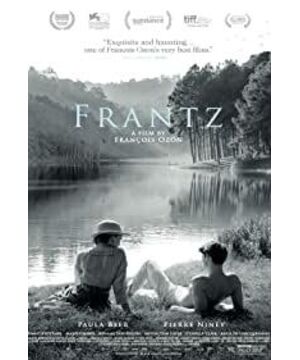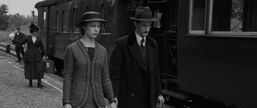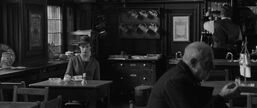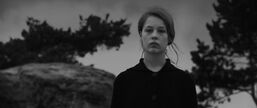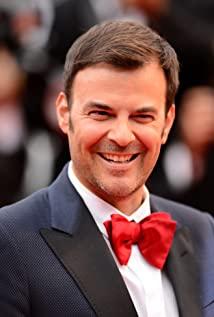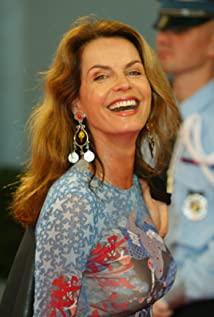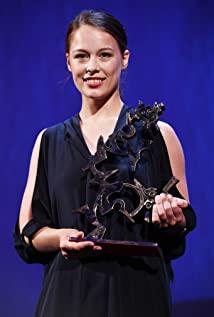Germany shortly after the end of World War I. A rustling wind blew through the cemetery, and flowers were laid on Franz's tombstone. Anna also held a bunch of flowers in her hand, wondering who the mysterious person who presented the flowers was. The caretaker of the cemetery said it was a Frenchman. He spat in disdain. Anna finally found the French youth, Adrian, a French soldier in World War I, a handsome and melancholy young man. When he came to Franz's house, he lied that he had made friends in Paris. Talking about the death of his friend, he couldn't help shedding tears of pain, as if he was about to commit suicide in the next second. His pain was so real that there was no doubt that he was the murderer of Franz, even though on the battlefield he was just doing his duty. Soon everyone liked the young man, because of his shy and warm personality, his gentleness, his love of art, poetry, and his violin, all like Franz.
In the cemetery, Anna recites Verlaine's poems in fluent French, and she uses Adrian as a stand-in for her fiancé. They also love art, and they both speak French—a secret language that belongs to Anna and Franz. She took him to the mountains. The lazy sunset cast golden light on the hills and the lake. The summer scenery gradually changed from black and white to color, which was warm. Only memories, lies, and heart-wrenching moments can give color to a heavy life. They sat on the hillside overlooking the city, talking intimately, everything seemed to go back to the past, Franz and Anna exchanged their lives in this way. Adrian listened to Anna's story of how a sudden embarrassment and guilt made him unbearable, so he jumped into the river, hoping to wash away his sins. The wind blew through the golden weeds behind them, and the fields rustled. It was a summer day in a small German town. The cool and peaceful river water soaked through his body, and the wounds of the war were gone. Since then, Adrian and Anna have gotten closer and closer. He took her to the ball, but he didn't have enough courage to hold her by the waist and hesitated; Anna ignored the strange eyes of the Germans and fearlessly pursued her own happiness. Back at Anna's residence, Adrian watched Anna, and in this moment of silence, he was eager and dodging, challenging and evading, but he left anyway. There, there was a kiss that didn't happen.
Not only Anna, but the Franz family were deeply attached to the young man; they saw him as a stand-in for the dead Franz. Even invited him to play at home. This time, the picture turns to color once again, and Adrian plays a very sad piece of music, as if it were his inner voice. In front of him, like Franz reappears, he gently pours out his thoughts. Franz's parents also completely forgot the pain of losing their son, as if they saw the light in their own eyes: it was an orange light, the warm gold of the violin, the radiance emanating from Adrian, Incarnate as Franz like an angel of light. In the film, Adrian and Franz in the camera are like a pair of two flowers, their bodies are slowly approaching, Adrian does not dodge, the camera is extremely ambiguous, like some unknown relationship. This scene reminds me of a poem by Celan, "Light of the Night":
It knows a French love song, which I sang in the autumn when I stayed at night as a traveler and wrote letters to the dawn. A beautiful boat, that coffin, carved out of emotional wood as I row it in blood, as if younger than your eyes Now you're as young as a dead bird, in the March snow Now it's coming to you, yes You sing its French love song you are the light: you will fall asleep in my spring till it passes and I am the messenger of the light: in front of strangers I sing.
Adrian is deeply immersed in the painful memories of murder, unable to bear this endless guilt and the other party's wrong love. Regret hit him like a bolt of lightning, and he fell to the ground in an instant, fainting, and the picture suddenly turned from color to dim. The desperate gesture of his fall is very much like the painting "Suicide" that he loves. He killed the innocent and pure self in the past with the sound of the piano. His fear, shame, forced him to flee. Anna knew that he must be waiting at Franz's grave, so she chased after him, and she did. At this moment, he revealed the truth. That would explain his lingering melancholy temperament, his neuroticism, his unpredictable behavior, all because of his experience. Franz was his only wound, the worst crime he had ever committed in his life, and he would have to pay for it with his life.
After he left, Anna fell into the abyss of despair again. This time, more than Franz's death, the hope that had rekindled in his heart was extinguished again. Although they still correspond, Anna chooses to bury the truth because the truth only causes pain. Those letters Franz wrote to her during his lifetime, through Franz's voice, Adrian's voice, the two overlapped, so she couldn't tell who it was; the only thing she could be sure of was that she had lost them both. The thoughts and memories of them spread endlessly in her body, making her unbearable, and she walked towards the icy river step by step. After being rescued, she decided to go to Paris to find him to confirm her love, and he was no longer Franz's stand-in. From the hotel to the cemetery, from Paris to the countryside, and finally find Adrian's mother in a manor. And when he saw Anna sitting in the living room, his eyes couldn't help but be ecstatic. He asked: Did they forgive me? In order to reassure him, Anna gave him an affirmative answer. He shook his head, his eyes somber: I can never forgive myself.
When the audience thought that Adrian and Anna could finally resume their relationship, the director gave a real and cruel arrangement: Anna saw the woman beside Adrian. Such an arrangement is unreasonable in film and television, but it is the most realistic. Anna's grief was so violent and sudden that she couldn't continue playing that night, just like when Adrian crashed to the ground. She hurried back to her room to pack her luggage, and Adrian chased after her. Perhaps the only thing he could give her was pity, and in that emotion mixed with pity and remorse, there was an undercurrent that had been brewing for a long time. There were tears in Anna's eyes, and their bodies were close together, but again he thought of Franz, looming like a scar from the past, reminding himself that he was never entitled to happiness; he also knew the separation It will continue, not only because of the mother and fiancée, but also because of Franz. If he could, he would rather die himself, but the strong suicide desire supports him to live and atone for Franz. Two very similar people, never-ending entanglement between death and life, this is also the thousand-mile-volt line buried deepest by the director. Just like the end of Lust and Caution, the relationship between the dead and the living, the relationship between the original hunter and the prey, is the ultimate possession.
At the station, just as Anna was about to leave, he finally broke through the cage of his ego and put his arms around her shoulders in despair, and then there was that sad goodbye. All the memories of the past suddenly flooded into his mind, the summer scenery from the German town, the intoxicating fragrance of wild grass, the night sky he saw after returning from the dance, Anna's smile and dress, and he finally realized his love for Anna. The light of life shone on him, but he had to dodge left and right. The kiss that was supposed to happen on a summer prom night, it just came too late. Anna finally waited for his hug, but she could only cry and say to him: It's too late.
At the end of the film, Anna came to Paris alone, and once again went to the Louvre to see the copy of Manet's "Suicide", which was also hung in Adrian's room. She watched the painting quietly, while a man with a similar face to Adrian sat beside her. For some reason, she felt the power to live in her depressing paintings. This time, Adrian did not kill her, although he had killed her twice before; she had lost her dreams in grief, and now it is not Adrian who lives in Franz's place, but It's her, Anna.
View more about Frantz reviews


